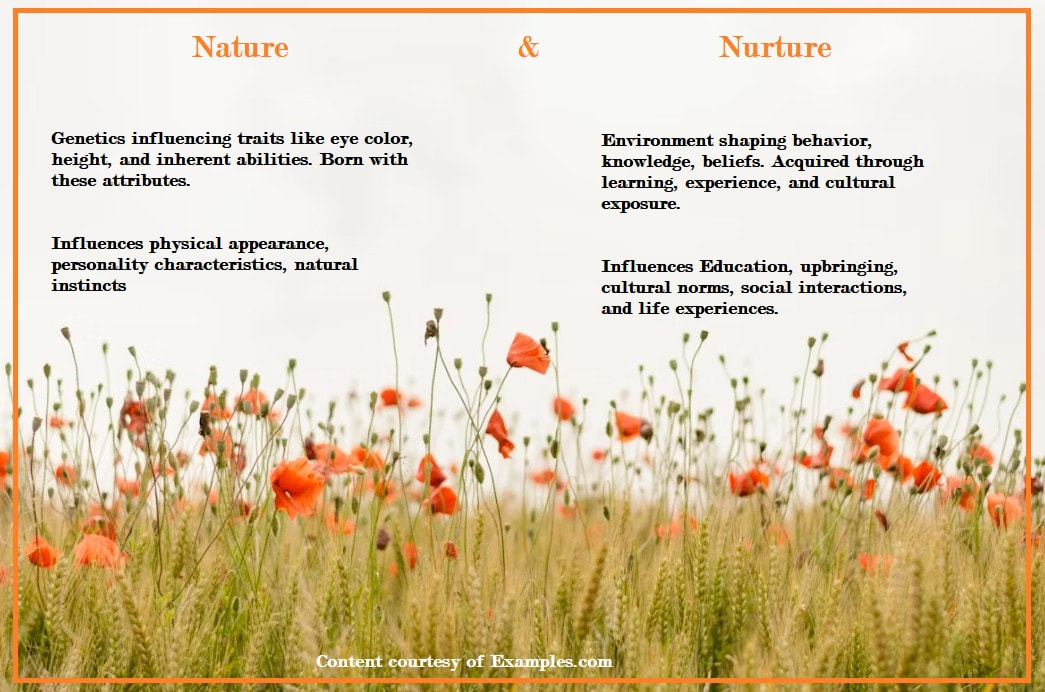god's design
Seeing The Difference
“While human nature largely determines how we hear the notes, it is nurture that lets us hear the music.” — Jonah Lehrer
Music enters through the ears — that's nature. But recognizing those sounds as music, rather than just noise, is the result of nurture — the learning and experiences that help us understand and respond.
“Find out what it is that touches you most deeply. Pursue it, learn about it, explore it, expand on it. Live with it and nurture it.” — Leonard Nimoy
Motivation in learning often comes through pursuing what matters to us. When we discover what moves us deeply, we begin to care for it, grow in it, and share it with others — this is how nurture shapes who we become.
God's Design
Nature and Nurture In Harmony
Nature and Nurture In Harmony
a Christ-centered home, both nature and nurture are part of God’s design. A child’s unique personality, abilities, and temperament are given by God (Psalm 139:13–14). But those natural traits are meant to be shaped and guided through loving nurture — through instruction, correction, and example rooted in God’s Word.
We are not called to let children drift in a sea of options but to guide them lovingly into truth. Scripture says, “Train up a child in the way he should go…” (Proverbs 22:6). That includes helping them recognize and develop their God-given nature within the boundaries of His righteousness and grace.
We are not called to let children drift in a sea of options but to guide them lovingly into truth. Scripture says, “Train up a child in the way he should go…” (Proverbs 22:6). That includes helping them recognize and develop their God-given nature within the boundaries of His righteousness and grace.
Examples From Scripture
GIRL: Mary (Mother of Jesus) – A Humble Heart, Nurtured in Faith➤ Nature:Mary seems to have had a naturally humble, thoughtful, and believing heart. Her response to the angel — “Let it be to me according to your word” (Luke 1:38) — reveals deep trust and receptivity to God.
➤ Nurture:Mary lived in a God-fearing Jewish household, where Scripture was taught, worship observed, and God's promises remembered. Her song in Luke 1 (the Magnificat) is filled with Scripture references, showing that she had been immersed in God’s Word from childhood.
➤ Result:Mary became the willing servant of the Lord, chosen to bear the Son of God. She raised Jesus faithfully, brought Him to the temple, pondered His words deeply (Luke 2:19), and remained faithful to Him to the cross and beyond.
🟢 Harmony: Mary’s quiet strength and humility (her nature) were nurtured by a life of Scripture, worship, and likely parental faithfulness — making her ready to obey when God called.
BOY: Samuel – A Tender Heart, Trained to Listen➤ Nature:Samuel was born with a tender and responsive spirit — even as a young boy, he was spiritually sensitive. This is seen when he hears God’s voice calling in the night (1 Samuel 3).
➤ Nurture:Samuel’s mother, Hannah, dedicated him to the Lord before birth (1 Samuel 1:11), and she brought him to the house of the Lord to be raised under Eli the priest. Though Eli was flawed, Samuel received instruction and exposure to the worship and service of God from a young age.
➤ Result:Samuel learned to say, “Speak, Lord, for your servant is listening.”
His God-given nature (spiritual sensitivity) was nurtured through faithful instruction, worship, and dedication. He grew to be one of Israel’s greatest prophets — a man who obeyed God’s voice and led the people with integrity.
🟢 Harmony: Samuel’s natural tenderness toward God was strengthened by a nurturing environment where prayer, sacrifice, and obedience were modeled.
✦ Final Thought:Both Mary and Samuel show how God-given traits (like sensitivity, humility, or belief) can be shaped into godliness through nurturing environments that center on Scripture, worship, and faithfulness. In both cases, nurture did not erase nature — it brought it to fruitfulness for God’s purposes.
➤ Nurture:Mary lived in a God-fearing Jewish household, where Scripture was taught, worship observed, and God's promises remembered. Her song in Luke 1 (the Magnificat) is filled with Scripture references, showing that she had been immersed in God’s Word from childhood.
➤ Result:Mary became the willing servant of the Lord, chosen to bear the Son of God. She raised Jesus faithfully, brought Him to the temple, pondered His words deeply (Luke 2:19), and remained faithful to Him to the cross and beyond.
🟢 Harmony: Mary’s quiet strength and humility (her nature) were nurtured by a life of Scripture, worship, and likely parental faithfulness — making her ready to obey when God called.
BOY: Samuel – A Tender Heart, Trained to Listen➤ Nature:Samuel was born with a tender and responsive spirit — even as a young boy, he was spiritually sensitive. This is seen when he hears God’s voice calling in the night (1 Samuel 3).
➤ Nurture:Samuel’s mother, Hannah, dedicated him to the Lord before birth (1 Samuel 1:11), and she brought him to the house of the Lord to be raised under Eli the priest. Though Eli was flawed, Samuel received instruction and exposure to the worship and service of God from a young age.
➤ Result:Samuel learned to say, “Speak, Lord, for your servant is listening.”
His God-given nature (spiritual sensitivity) was nurtured through faithful instruction, worship, and dedication. He grew to be one of Israel’s greatest prophets — a man who obeyed God’s voice and led the people with integrity.
🟢 Harmony: Samuel’s natural tenderness toward God was strengthened by a nurturing environment where prayer, sacrifice, and obedience were modeled.
✦ Final Thought:Both Mary and Samuel show how God-given traits (like sensitivity, humility, or belief) can be shaped into godliness through nurturing environments that center on Scripture, worship, and faithfulness. In both cases, nurture did not erase nature — it brought it to fruitfulness for God’s purposes.
Responsive Households
When we think of family rightly, we see parents as stewards, not owners — caretakers of both their own lives and the children God has entrusted to them. Earthly parenting begins with physical care: feeding, clothing, comforting, and taking children to the doctor when they’re sick. But this is only part of the picture.
Parents also need Jesus — not only for themselves, but to help nurture their children’s spiritual lives. Without Christ, children may receive good care but still miss what they need most: a relationship with the God who made them. Jesus loves children. He wants them to have a life shaped by love, renewed by truth, and guided by a willing spirit — a life that prepares them for eternity.
Jesus said, “Anyone who loves me will obey my teaching. My Father will love them, and we will come to them and make our home with them” (John 14:23). A responsive household welcomes God's presence and follows His ways — not only in belief, but in daily life.
Parents also need Jesus — not only for themselves, but to help nurture their children’s spiritual lives. Without Christ, children may receive good care but still miss what they need most: a relationship with the God who made them. Jesus loves children. He wants them to have a life shaped by love, renewed by truth, and guided by a willing spirit — a life that prepares them for eternity.
Jesus said, “Anyone who loves me will obey my teaching. My Father will love them, and we will come to them and make our home with them” (John 14:23). A responsive household welcomes God's presence and follows His ways — not only in belief, but in daily life.
Becoming Skillful Workers
Children are encouraged to follow Jesus’ example in submitting to training and preparation — not rushing through it, but embracing the years of learning that shape character and purpose. Jesus spent most of His life in quiet, faithful work, honoring His earthly parents and preparing for His ministry. In the same way, God honors the development of biblical understanding, life skills, and vocational training.
Much is learned through daily household responsibilities — from chores to conversations — all of which reflect love, build discipline, and please the heavenly Father. As children take part in these rhythms, they not only grow in confidence and competence but also begin to recognize their gifts, including potential spiritual gifts for future service.
Learning trades, developing habits of honest work, and stewarding personal talents can open doors to fruitful ministry in the church and meaningful contributions to the community. These skills may also shape vocational direction and prepare children to face real-life challenges — including paying for further training, enduring seasons of financial strain, or navigating job loss or relocation with resilience and wisdom.
Preparing For Life
You may be young now, but God is already preparing you — and your family — for meaningful work in His kingdom. As you study the Bible, ask questions, and learn to follow Jesus, you are also helping your parents grow in their faith. When families open God’s Word together, both children and parents learn from each other, encourage one another, and grow stronger in love and truth. Every moment spent learning, praying, or serving together is part of God’s training.
Be a joyful student of His Word — eager to learn, unafraid to ask, and ready to serve — as He shapes you into a faithful worker who honors Him in every season of life.

